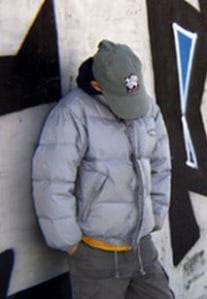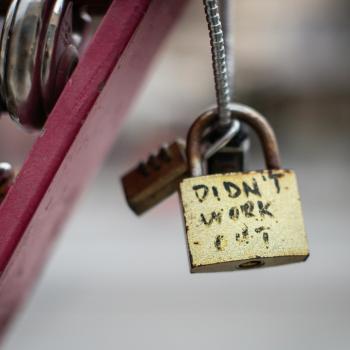Patheos' "The Habit of Witness" series features essays written by consecrated Catholic women and men sharing their experiences while dressed in the habit. In this sixth installment, a Canossian sister shares an encounter that helped calm a guilt-wracked young man bereft of hope, through the Good News of Christ’s mercy and salvation.
 On a beautiful morning, after meeting a friend for coffee, I declined her offer of a ride home; it was such a nice day, I really wanted to walk and pray along the one-mile stretch of road.
On a beautiful morning, after meeting a friend for coffee, I declined her offer of a ride home; it was such a nice day, I really wanted to walk and pray along the one-mile stretch of road.
Starting out down the street, I asked the Lord to help me see what he wanted me to see, that I might be a witness of His love. (I’ve gotten into the practice of starting this way whenever I go out, because it’s so easy for me to get caught up in my own thoughts and miss an opportunity along the way!) I prayed my rosary, each bead for those whose path I crossed: the service worker at the gas station; the teenage girls walking and chatting animatedly on the side of the road; the beggar ‘Tony’ sitting in his usual place with a cup of coffee and his portable stereo blaring; the drivers passing by in their cars . . . all these people accompanied me. Another block, another few beads prayed: for the travelers; for the mom with her child in tow; for the kids on their skateboards; another step, another prayer.
Approaching the next intersection, there next to the traffic light, stood two high-school aged boys. One of them called out to me from a distance, a greeting I couldn’t make out. As I came closer, his friend crossed the street, and went on his way. I silently prayed to the Lord, “If this is another prank, give me patience!” (As a side note, it does happen from time to time, that kids will try to ‘ruffle my feathers’ trying some harmless prank at my expense! Alas, this too is part of wearing the habit). But as I came closer, I could see in his face that something wasn’t right. His broad forehead was furrowed; his eyes raw, as though he’d been up all night. He spoke again.
“Hi ma’am,” he said, a tentativeness in his voice, “are you a woman of God?”
“Yes, I am,” I responded, “is there something I can do for you?”
Looking down at his feet, he stammered, hardly audible, “I’m not sure what you can do, but I really could use your prayers.” He went on to explain how he had gotten into a lot of trouble at school, and as a result of it, he was expelled. Naturally, his folks are angry, and they worry he won’t be able to go on to college. “I’ve ruined everything! I have no future now!” Tears escaped from the corners of his eyes.
I asked if he belonged to a particular church. He said “Southern Baptist” but that he and his family hasn’t attended for a long time.
Before me stood a young man, obviously at odds with himself over the predicament he’d gotten himself into. My concern for him was to not see him become another statistic. I made a silent prayer asking the Holy Spirit to give me the words this young man needed to hear.
Our society is becoming more and more out of touch with reality. Our actions tend to be more disconnected from the consequences. In video games, when we make a wrong move, we can start again; movies and television often portray the protagonist as a bright, mischievous person; the audience is encouraged to cheer when they bend the rules and come out ahead. In real life too, we see popular figures caught up in adultery, drugs, violence, and vandalism who appear to resume their lives of success and fame with seemingly no long-term consequences for their actions.
The reality is, everything we do has a consequence. Here before me was a young man, in some ways still a boy, having to find a way through a tough lesson. I knew what I had to do.
We talked about actions and consequences. “Do you understand that what happened to you is a result of your actions?”
He looked at me as though the words stung, but after a pause, he said, “Yes, I do. I just didn’t want to admit it.”
I decided to dig in a little more, “Do you think the judgment was fair?”
After another pause, he told me that he understood that they had to punish him, but that now he didn’t know what he was going to do. He will probably graduate with a GED. He’s not sure about his college prospects. He doesn’t know how to live down the disappointment he caused for his parents.
Another tough question for him; I asked him if he was sorry for what he did. I could see that he would like to take it back.




